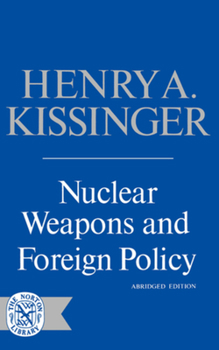Nuclear Weapons and Foreign Policy
Select Format
Select Condition 
Book Overview
In this book Professor Kissinger examines the framework of our foreign policy, the stresses to which that framework is being subjected, and the prospects for world order in an era of high international tension. The three essays were written before Professor Kissinger took leave from Harvard to serve as Assistant to President Nixon for National Security Affairs.
Format:Paperback
Language:English
ISBN:0393004945
ISBN13:9780393004946
Release Date:May 1969
Publisher:W. W. Norton & Company
Length:276 Pages
Weight:0.60 lbs.
Dimensions:0.6" x 5.0" x 8.0"
Customer Reviews
2 ratings
Pertinent to todays political situation
Published by Thriftbooks.com User , 20 years ago
Why write a review on a book about nuclear weapons and foreign policy that is nearly fifty years old and does not reflect the current geo-political situation? Because it is a darn good book. Kissinger has a way writing that is succinct and to the point, he has the genius of explaining complicated subjects in simple terms. The basic premise of the book is that the United States should not rule out the use of nuclear weapons in foreign policy. He argues persuasively that the limited use of nuclear weapons need not escalate into cataclysmic nuclear exchange. The forces of history have made this a moot point. The Soviet Union lies in the dustbin of history and the surviving Russian republics are not capable of launching an effective nuclear counterstrike- the United States alone is now the worlds surviving superpower. It is entirely conceivable that we could initiate a nuclear strike with relative impunity now. Whether or not this would be politically or morally correct is a matter of debate. But more importantly, the development of smart weapons have made the use of massive nuclear or even limited nuclear attack unnecessary. But what makes this book worth the read is Kissingers insightful political analysis. For instance, he argues that it is impossible to use traditional diplomacy based on good faith and a willingness to come to an agreement with a revolutionary power because such governments do not operate under the presuppositions of Western civilization. Diplomatic meetings between such diverse powers are not seen by revolutionary powers as opportunities to come to an agreement and to avoid conflict, but as elaborate stage plays which to seek to influence and win over public opinion in other nations. This is a lesson that those who wonder why the Moslem world hates the United States and who believe that if we just sit down and talk we can come to a reasonable understanding need to learn. Kissinger would say that such people live in a fools paradise. The use of force is not an evil but a strategic necessity if civilization is to be preserved. Many liberals today believe that if the United States would just disarm and be more understanding of the Moslem world that the Osama Bin Ladens of this world would cease their hatred of us. What these starried-eyed liberals do not understand is that the Moslem extremist do not hate us for what we do, but for who we are. Their attacks will not stop until our civilization is destroyed. Kissinger noted that the Turks did not stop voluntarily at the gates of Vienna or the Arabs in Southern France. Rather, a line was established because they had been defeated in battle, and the decay of Arab power did not set in until the West exercised unremitting pressure to push them back. Kissinger does not argue for the use of force over diplomacy, but that diplomacy is ineffective when the use of force has been abdicated. Only when a nation stands ready to defend itself and is willing to use force will
ADVOCATES DEVELOPMENT OF LIMITED WAR DOCTRINE
Published by Thriftbooks.com User , 23 years ago
The main premise of this 1958 book is that the USA must plan for a limited war and not assume that all wars will be total ones, like World War II. Kissinger argues that our failure to do this caused great trouble in Korea and put us at a disadvantage in dealing with the Soviet Union. Chapters discuss our allies, Soviet propaganda, and disarmament. The book is well written and most persuasive. Of course it should be clear to everyone that a book over forty years old is of limited value today, especially as the Cold War is over. Kissinger warns us about the now disproved missile gap and fails to appreciate the Chinese-Soviet split, which had already started. My one major disagreement concerns Kissinger's contention that limited use of nuclear weapons in war could be more appropriate than convential ones. He ignores the profound consequences crossing such a line would entail. He is right that any side using regular forces would be vulnerable to nuclear attack, but that does not mean that we must use them to start with! In fact, not using them sends the world an important message about how serious we are in wanting to avoid a total, nuclear war.






